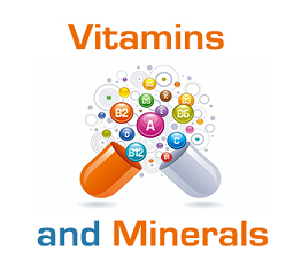You catch vitamins and minerals are good for you. But what does your body really need? And is it realizable to get too much of a good thing?
What Are Vitamins and Minerals?
Your body requirement vitamins and minerals to work appositely. You obtain them from the foods you eat every day.
Vitamins decline into two types: fat soluble and water soluble (pronounced: SAHL-yuh-bul):
The fat-soluble vitamins — A, D, E, and K — disappear in fat and are save in your body.
The water-soluble vitamins — C and the B-complex vitamins (such as vitamins B6, B12, niacin, riboflavin, and folate) — disappear in water. Your body can't store these vitamins. Anybody B or C vitamins that your body doesn't use progress across the bloodstream and is lost (mostly when you pee). So you need a fresh provide of these vitamins every day.
Vitamins are organic material, which means they’re made by plants or animals. Minerals are inorganic component that procced from soil and water, and are absorbed by plants or eaten by animals. Your body requirement larger number of some minerals, such as calcium, to grow and stay healthy. Other minerals like chromium, copper, iodine, iron, selenium, and zinc are called trace minerals because you requirement only very small number of them.
How Do I Get the Vitamins and Minerals I Need?
Eating well now is mostly necessary because the body needs a disparate of vitamins and minerals to grow and stay healthy.
Eating a mix of foods is the best way to get all the vitamins and minerals you need each day. Fruits and vegetables, whole grains, low-fat dairy by - product, lean meats, fish, and poultry are the best choices for getting the nutrients your body needs.
When determine what to eat, check up food labels and collect items that are high in vitamins and minerals. For example, when choose a drinks, you'll find that a glass of milk is a good source of vitamin D, calcium, phosphorous, and potassium. A glass of soda, on the near hand, doesn't have any vitamins or minerals.
You can also contented your taste buds without oblation nutrition while dining out: vegetable pizzas or fajitas, sandwiches with lean cuts of meat, fresh salads, and baked potatoes are just a few delicious, nutritious choices.
If you're a herbivorous, you'll need to plan thoughtfully for a diet that includes the vitamins and minerals you need. The greatest root for the minerals zinc and iron are meats, fish, and poultry. But you can obtain these from dried beans, seeds, nuts, and leafy green vegetables like kale.
Vitamin B12 is key for making red blood cells and keeping nerves active well. It is found only in animal products. If you don't eat meat, you can get vitamin B12 from eggs, milk and other journal farm foods, and support breakfast cereals. Herbivore(vegetarians who eat no animal products at all, including dairy products) may need to take vitamin B12 supplementation.
Vitamins and Minerals
Vitamins and minerals are all-important, matter that our bodies need to grow and function normally. The known vitamins involve A, C, D, E, and K, and the B vitamins: thiamin (B1), riboflavin (B2), niacin (B3), pantothenic acid (B5), pyridoxal (B6), cobalamin (B12), biotin, and folate/folic acid. A number of minerals are necessary for health: calcium, phosphorus, potassium, sodium, chloride, magnesium, iron, zinc, iodine, sulfur, cobalt, copper, fluoride, manganese, and selenium. The healthy instruction for Americans 2015–2020 suggest that people should aim to meet their nutrient requirements through a healthy eating pattern that includes nutrient-dense forms of foods.
Like vitamins, minerals also help your body function. Minerals are factor that our bodies need to responsibility that can be found on the earth and in foods. Some minerals, like iodine and fluoride, are only necessary in very small amounts. Others, such as calcium, magnesium, and potassium, are necessary in larger quantity. As with vitamins, if you eat a mixed diet, you will possibly get enough of most minerals.
Measurements for Vitamins and Minerals
Vitamins and minerals are calculated in a variation of ways. The most common are:
Mg – Milligram (a Milligram is one thousandth of a gram)
Mcg – Microgram (a Microgram is one millionth of a gram. 1,000 micrograms is equal to one milligram)
IU – International Unit (the conversion of milligrams and micrograms into IU depends on the type of vitamin or drug)
What Do Vitamins and Minerals Do?
Vitamins and minerals raise the clear off system, carry natural growth and development, and support cells and organs do their activity. For example, you've enough heard that carrots are good for your eyes. It's true! Carrots are totaly of material called carotenoids (pronounced: kuh-RAH-teh-noydz) that your body transform into vitamin A, which helps stop eye issue.
Vitamin K support blood to clot, so cuts and scrapes stop bleeding fast. You'll discover vitamin K in green grown vegetables, broccoli, and soybeans. And to have powerful bones, you should eat foods such as milk, yogurt, and green leafy vegetables, which are rich in the mineral calcium.




No comments:
Post a Comment